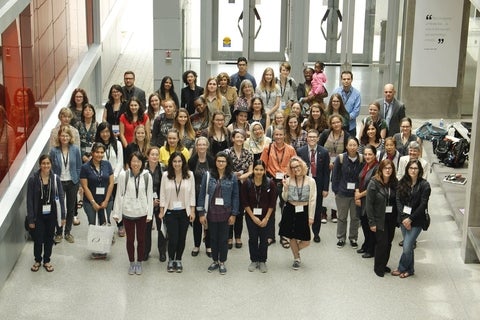
The Women in Physics Canada (WIPC) conference, hosted by the University of Waterloo, Faculty of Science, Department of Physics & Astronomy and the Institute for Quantum Computing, will bring together early career scientists to present their research and hear plenary talks from leaders in physics.
This is an annual national conference aimed primarily at (but not restricted to) graduate students in physics, astrophysics and related fields. The format of the conference consists of student presentations, keynote lectures, panel discussions, workshops and opportunities for interaction. We welcome attendance by people of all genders.
Goals of the conference
WIPC is first and foremost a scientific conference, in which early career scientists have the opportunity to present their work and to hear plenary talks from leaders in the field. Its intent is also to provide support to early career women, encouraging them to continue in a career in science.
The conference provides participants with the opportunity to network with women in physics from across Canada, to facilitate the sharing of experiences, ideas and advice. WIPC aims to foster a sense of community and belonging among participants.
Group photo of 2017 speakers

Conference speakers
Conference schedules
Previous conferences
Previous editions of WIPC ran successfully at:
- 2016: University of Saskatchewan, Saskatoon, Saskatchewan
- 2015: University of Toronto, Toronto, Ontario
- 2013: Simon Fraser University, Burnaby, British Columbia
- 2012: University of British Columbia, Vancouver, British Columbia
- 2011: Perimeter Institute, Waterloo, Ontario
Call for proposals
The conference is generally held in the summer period; the format of the conference consists of student presentations, keynote lectures, panel discussions and opportunities for networking.
The WIPC steering committee is seeking hosts for the 2018 conference and beyond. Interested groups or individuals should submit a proposal before Friday, October 27, 2017. Proposals will be accepted after this date, until a host has been selected. The steering committee is happy to discuss any aspect of the conference, including possible sources of support, with interested parties.
Proposals should include:
- Detailed budget (including student travel support)
- Proposed registration fees
- Details on affordable accommodations
- Venue information
- Conference programming
- Anticipated participation
- Organizing team
Proposals and questions should be sent to wipc-steering-committee@googlegroups.com.
WIPC Committee
Anne Broadbent, University of Ottawa
Melanie Campbell, University of Waterloo
Sarah Johnson, Simon Fraser University
Mercedes Martinson, University of Saskatoon
Janis McKenna, University of British Columbia
Li-Hong Xu, University of New Brunswick























